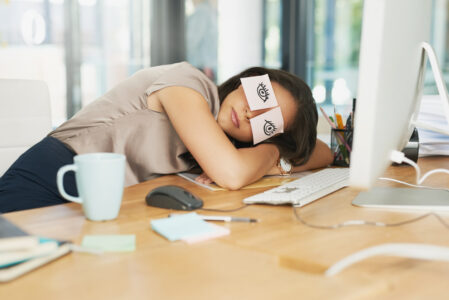Staying Alert at Work: Struggles and Solutions
The internet is flooded with searches like “How to stay awake at work” or “How to stop falling asleep at work,” highlighting a common problem affecting productivity and overall well-being. In this blog post, we will answer these questions and explore the causes and consequences of feeling tired at work and provide valuable tips to help you combat workplace drowsiness effectively.
Feeling tired at work is a problem a lot of workers encounter, and it can have significant negative repercussions. Whether it’s struggling to keep your eyes open during a crucial meeting, yawning throughout an important presentation, or making avoidable mistakes due to tiredness, the impact of workplace drowsiness is indisputable.
The Effects of Feeling Tired at Work
There are a number of negative outcomes of being tired at work, and it’s important to recognise these and know when you should take action to help combat feelings of drowsiness during the day.
Decreased Productivity: Being tired at work reduces your ability to concentrate and make clear decisions, leading to decreased productivity.
Health Implications: It’s not just your work that might suffer, lack of sleep over a long period can have severe health implications such as cardiovascular issues, obesity, and mental health issues such as anxiety and depression.
Strained Relationships: We all know how irritable we can be with friends or partners when we’re drowsy, but this can also apply to your colleagues. Not only might you be snappier than usual, but your lack of productivity can also cause issues for other people in your workplace.

Ensuring You’re Looking After Your Mental and Physical Wellbeing
Maintaining your mental and physical well-being is crucial to staying alert at work. Here are some vital steps you can take:
Prioritise Sleep: Aim for 7-9 hours sleep per night. Do this by setting a bedtime and allowing yourself to unwind by reducing screen time in the evening.
Stay Hydrated: it’s not just sleep that can lead to workplace fatigue; dehydration can also lead to fatigue. Keep a large bottle of water with you at work and sip it throughout the day. You can even buy bottles with times on to keep you on track.
Balanced Diet: As well as water, a lack of certain nutrients can lead to fatigue. Avoid energy crashes by consuming less caffeine and sugar. A balanced diet is one of the most important factors for general health.
Regular Exercise: You should aim to exercise regularly throughout the week. The NHS recommends 150 minutes of moderate exercise spread over 3 or 5 days. Not only will this boost energy levels, but it will also improve sleep quality.
Manage Stress: Levels of stress hormones are an important factor in the quality of your sleep. Practice stress management techniques like meditation, deep breathing exercises, or mindfulness to keep stress levels in check.
Tips to Combat Tiredness at Work
Now that we’ve covered the importance of overall well-being, let’s take a look at some practical tips to help you combat tiredness at work:
Break It Up: Breaking your workday into manageable chunks can help to maintain focus by ensuring you’re not getting bored of one long, monotonous task.
Stay Active: As well as regular exercise, you should also try to move around throughout the day, even if that’s a 30-second walk to the kitchen to grab a drink or snack. Being active throughout the day can help to alleviate feelings of lethargy.
Natural Light: Sunlight is a great way to keep your brain awake. If possible, work in an environment with plenty of natural light to boost your mood and alertness.
Ergonomic Workspace: You can prevent physical fatigue by making sure that your workspace is comfortable and ergonomic.
Healthy Snacks: Eating healthy snacks instead of crisps and sweets can help boost your energy levels throughout the day by keeping them at a steadier level. This will avoid sugar crashes.
Power Naps: Workplace permitting, you should try a power nap every once in a while. A short nap of 15-20 minutes can boost energy levels significantly.

Stay Social: A good natter with a colleague can help to keep your brain active and engaged. You could double your productivity by having a chat about a work project.
Limit Screen Time: Minimise excessive screen time during breaks. Overexposure to screens can contribute to eye strain and fatigue.
By implementing these tips, you can create an environment that will help you stay alert at work and maintain your overall well-being.
Remember, staying alert at work is not just about avoiding the negative consequences of drowsiness; it’s about thriving and excelling in your professional life. So, take charge of your well-being and productivity, and say goodbye to the days of falling asleep at work.
To find out more about careers at SEFE Marketing & Trading please visit our homepage.
The views, opinions and positions expressed within this article are those of our third-party content providers alone and do not represent those of SEFE Marketing & Trading. The accuracy, completeness and validity of any statements made within this article are not guaranteed. SEFE Marketing & Trading accepts no liability for any errors, omissions or representations.







